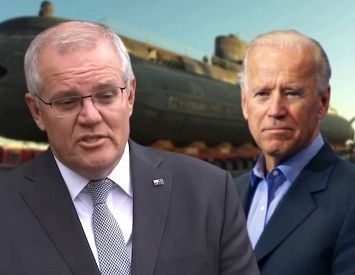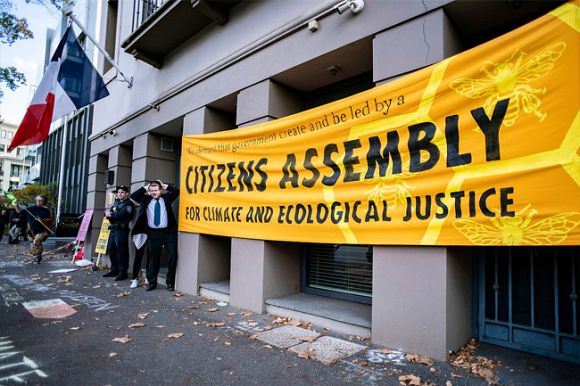The United States is a nation in decline and exceptionalism has blinded us into a dangerous allegiance, writes Bilal Cleland.
What is Democracy?
Abraham Lincoln, in the Gettysburg Address, 19 November 1863, gave one of the most often quoted statements about democracy.
He described it as “government of the people, by the people, for the people”.
It was a state which was not approached in the USA for 100 years, until Black Americans got the right to vote.
Government “of the people” assumes all of the citizens shall be subject to the law without exception or privilege.
“By the people” assumes that all citizens shall have a role in government as voters, candidates and participants in decision-making.
“For the people” assumes that government will seek to serve the people through just and compassionate policies.
Democracy was a political goal of the English working class in the 1800s, called the Chartist Movement.
It produced The People’s Charter of 1838 with six demands then seen as basic requirements of a democracy.
They were:
- universal manhood suffrage;
- equal electoral districts;
- vote by secret ballot;
- annually elected parliaments;
- payment of members of Parliament; and
- abolition of the property qualifications for membership.
It met an extremely hostile reaction from the wealthy classes which believed civilisation would end if the charter succeeded.
All of the points except for annual parliaments were eventually accepted, including votes for women, not just men.
The secret ballot was called the Australian ballot as it was first introduced in Tasmania in 1856.
Many countries have not really overcome the problem of electoral districts which are frequently gerrymandered to suit particular interest groups. This is most marked in the USA.
Australia has largely overcome this with the appointment of independent electoral commissions to oversee such matters.
Mythology of the West
Right-wing politicians talk much about “Western culture” and “Western democracy”, always drawing distinctions between that pinnacle of civilisation and “the other”. This is echoed by the corporate media which is controlled by very narrow interest groups.
During the War on Terror, “the other” was usually Muslim-majority countries, places portrayed as barbaric and inclined to terrorism. This suited the dominant power plays justifying the interventions in Iraq and Afghanistan, with the results we can now see so clearly.
With the rise of the Chinese superpower, which has itself adopted the Islamophobia of the West when dealing with its Muslim minorities, the dominant Western narrative has transformed into the threat of Chinese economic influence.
The rise in recent years of White terrorist-oriented groups in many democracies has led to a focus on the health of the democratic system of government.
The Economist Intelligence Unit published a study in February 2021. It found 37 per cent of the world’s population still lived under authoritarian regimes.
Full democracies only account for only 6.4 per cent of the world’s population. Norway tops this list, followed by New Zealand, Finland, Sweden and Iceland. Australia is ranked 9th.
According to Eurasia Review:
Full democracies are nations where:
- civil liberties and fundamental political freedoms are respected;
- valid systems of governmental checks and balances exist;
- there are limited problems in democratic functioning; and
- media is diverse and independent.
The absence of a diverse and independent media is one threat to democracy which is increasingly serious in many countries including Australia.
The Fulcrum found:
‘For the past six years, Americans have lived in a “flawed democracy,” one dragged down by high levels of polarisation and events like the 6 January 2021 insurrection, according to an annual study of global democracy.’
Eurasia Review states:
Flawed democracies are nations where:
- elections are fair and free;
- basic liberties are honoured but may have issues; and
- there are issues in the functioning of governance.
According to The Fulcrum, the EIU
...ranks the United States 26th of 167 countries, sandwiched between Chile and Estonia, when measuring electoral process, government functionality, political participation, political culture and civil liberties.
On a 10-point scale, the U.S. earned 7.85 points — slightly down from last year's 7.92 and the nation’s lowest score since the EIU created the index in 2006.
Australia scored 8.96 points.
Leader of the free world?
The United States' claim to lead the free world is becoming suspect.
The United Nations Office of Sustainable Development (UNOSD) dropped the U.S. to 41st worldwide, down from its previous ranking of 32nd. The U.S. ranks between Cuba and Bulgaria which are regarded as developing countries.
Kathleen Frydl argues that these ratings are the result of racism and exceptionalism:
‘Racism has cheated many Americans out of the health care, education, economic security and environment they deserve. At the same time, as threats to democracy become more serious, a devotion to “American exceptionalism” keeps the country from candid appraisals and course corrections.’
Income inequality in the U.S. is severe. By the OECD’s measurement, it has the biggest wealth gap among G-7 nations.
The U.S. currently ranks 21st on the UN’s Development Program Index.
One great weakness in countries that are powerful – like England, the USA, Russia and China – is that they become arrogant and believe that they are exceptional.
The English still have not learned their lesson despite Brexit, but what is now happening might awaken more of them.
The Han dominance movement which many commentators have seen in China is a sign that arrogance is not just Western.
The Hindu extremist movement in India threatens ethnic and religious minorities in that country.
The USA, however, is probably the most outstanding example of a nation that regards itself as superior to all others, with little justification.
The idea of American exceptionalism, a belief in American superiority over the rest of the world, is pervasive.
Frydl continues:
‘Both political parties have long promoted this belief, at home and abroad, but “exceptionalism” receives a more formal treatment from Republicans. It was the first line of the Republican Party’s national platform of 2016 and 2020 (“we believe in American exceptionalism”).’
A country that is in decline, that is rich but impoverishes millions of its people, denies them adequate health care, avoids taxing the super-rich and yet wants to shape up to the booming and powerful Chinese military and economic machine, believing in its exceptionalism, is a dangerous entity for Australia to tie itself to through unwise military alliances and submarine deals.
A Republican victory, whether Trump or not, would increase the danger of military conflict which is already a serious threat.
Bilal Cleland is a retired secondary teacher and was Secretary of the Islamic Council of Victoria, Chairman of the Muslim Welfare Board Victoria and Secretary of the Australian Federation of Islamic Councils. You can follow Bilal on Twitter @BilalCleland.
Related Articles
- 'No more thoughts and prayers': Students protest gun violence
- The USA, CIA and a poor night’s sleep for the world
 This work is licensed under a Creative Commons Attribution-NonCommercial-NoDerivs 3.0 Australia License
This work is licensed under a Creative Commons Attribution-NonCommercial-NoDerivs 3.0 Australia License
Support independent journalism Subscribe to IA.


















